The paradox of choice paralyzes Millennials. We have instant access to everything, and while it may help in some ways, instead we suffer from information overload. Between Buzzfeed articles, student loans, Instagram filters, Starbucks orders and job searches, Millennials have to make more decisions before breakfast than previous generations did in a lifetime.
While experiencing growing pains in the Information Age allows Millennials to be street smart, tech savvy and hyper-selective, there’s no doubt this generation’s stress levels are through the roof. But are Millennials more stressed out than previous generations? And if so, how do they deal with the stress?
Millennials: The Generation of Stress?

The truth is, Millennials face the same stressors as all 20-somethings in previous generations: uncertainty of the future, social and financial stability, finding their place in the world (typical coming-of-age movie material). However, growing up in the Digital Age provides a major plot twist.
While previous generations sought after enough money, success and happiness, Millennials stress out about this stuff while being inundated with ideas and archetypes of a “perfect life” via social media, TV, magazines and dozens of other outlets.
Dr. Richard Harvey, co-chair of the American Public Health Association and Assistant Professor at the Institute for Holistic Health Studies at San Francisco State University, argues that several factors contribute to the idea that Millennials are more stressed out than previous generations.
“Millennials have more pressures on them and less ability to control their world,” he said.
The fundamental concept is not that high levels of anxiety didn’t exist 40 years ago, but that stressors (and how people cope with them) evolve with society.
“I don’t think Millennials are any more stressed out than any other generation, they’re just stressed out about different things,” said Brian Van Brunt, Senior Vice President of the National Center for Higher Education Risk Management. “They really had a lot of doubt about the system, you know, watching it collapse around them. Is the financial crisis gonna wipe out our currency? Is the government going to be here? The big one: ‘Is college worth it?’”
Van Brunt believes that one of the biggest challenges that Millennials face is deciding where to put their loyalties. While Millennials are marked as more passionate and dedicated than previous generations, they are also more analytical. Growing up with a lack of trust in their surroundings causes Millennials to be both skeptical and demanding. Graduating college and getting a job are increasingly difficult, which leaves many students in an existential tailspin. With everything in a constant state of flux, the future looks a lot more uncertain (and a lot more stressful) than it did a decade ago.
Is Social Media the Anxiety Aggressor?

According to the U.S. Chamber of Commerce, 75 percent of Millennials have created a profile on social media. Eighty percent sleep with their phone next to their bed.
Social networks such as Facebook and Instagram allow Millennials to compare themselves in a way that didn’t exist before. We can glimpse into the personal lives of friends and strangers, in which they tend to display their triumphs rather than their tribulations.
“Millennials have access to other people’s lives in a way that is totally new,” said Natalie Cox , who worked with Millennials as a yoga instructor for six years. “In the 50s it was comparing yourself to the Joneses…but now Millennials can look at a whole world of people and see who’s doing better than them, that’s where that pressure comes from.” She refers to social media as a “curated exhibit of your most awesome life.”
“I know that I and a lot of people use technology and social media to distract themselves and blow off steam so in that way it can serve as a de-stressor, but also with them comes an expectation to be constantly in communication which can be a stressor,” said Declan Womble-Meisner, a junior engineering major at San Francisco State.
The advent of social media and the Internet also changed the way our generation views the world. With so many people, organizations, institutions and belief systems to compare and contrast, Millennials feel pressured to seek a purpose, stand out and leave an indelible mark on society.
How Do We Cope?

“For me growing up, it was ‘Do you drink or do you not drink? Or do you smoke marijuana or weed or do you not?’” Van Brunt said. “For Millennials…it becomes a much more complicated set of questions about not only do you want to tune out, but…how do you want to tune out?”
Much like apps on our phone, we choose the quick, easy and inexpensive route, which often means coping in ways that are detrimental to our health.
“I think the most common ways to deal with stress is definitely drugs or alcohol it’s a very easy and accessible way to escape and avoid your problems,” said Womble-Meisner. “I mean, its not healthy but neither is stress.”
According to Harvey, Millennials are at least 10 to 20 percent more likely to overeat or overdrink. Earlier generations were not exposed to the “quick and easy” mentality that fuels Gen Y.
With dozens of things to freak out about, it’s no surprise that this generation has introduced dozens of ways to cope with stress. The emergence of designer drugs, prescription pills and pharmaceutical cocktails has done little to assist the generation’s bad rap.
Before you start referring to it as “Gen High,” Gen Y has witnessed an increase in healthy stress-relieving activities as well. Cox believes physical, spiritual and mental practices are the answer to Millennial stress.
“I feel like the expectations are so high for [Millennials] to constantly be performing and so when you go to yoga class if its done right, it’s a time for you to sort of step away from that performance and not have to prove anything to anyone and just like be in your body and that’s a space that I think is really lacking in American culture right now,” she said.
We Are The Problem, But We Are Also The Solution

Relaxation and Stress Reduction lecturer Kenn Burrows argues that Millennials are responsible for a shift in the paradigm of success. A linear path to success and the concept of the traditional American Dream have been significantly altered.
“At one point in time being a success just meant staying alive or having everything you need or living a happy life,” said Womble-Meisner. “Now I feel like to be successful there is an expectation of excess wealth.”
Previous generations took solace in stability, and though that was familiar and arguably less stressful, Millennials are also equipped to embrace fluidity and change. Van Brunt argues that it’s characteristics like these that give Gen Y passion and drive: the idea of doing something different, new and exciting.
Whether Millennials are more or less stressed than other generations may remain an enigma, but finding clarity among the chaos doesn’t have to be.
“Get clear about what you value most and who you are, what you’re passionate about and use that to cut through all the environmental fluff that’s being generated by the Information Age. Sail your boat versus someone else’s,” said Burrows. “If you’ve got what you’re saying yes to, it’s easier to say no to lots of things.”
The key to success in the Information Age is sifting through all that info and discovering your own path.
“Doing what feels good I think is important, one of the lessons that you guys have above the other generations. It’s not just about the job, its not just about the money, it’s not just about creating something of meaning, but you choose for yourselves,” Van Brunt said. “So all that can feel really scary. It’s also a really cool opportunity.”



















